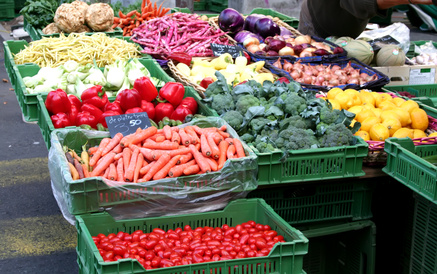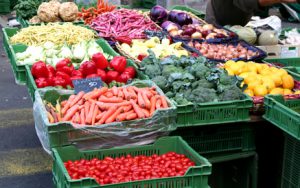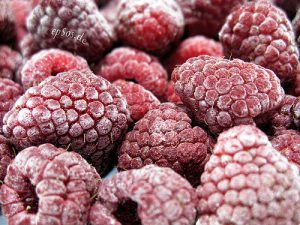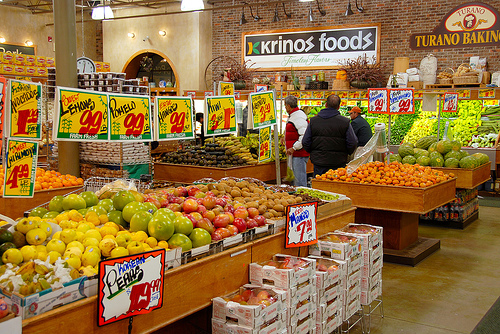
by Jessica Josh
A surprising report released this week from the Institute of Mechanical Engineers details that 50% of all food produced goes to waste due to spoiling, and over-purchasing. This is equal to 1.2 – 2 billion tonnes of food a year. This waste leads to environmental degradation and, for us, it ultimately leads to price rises on fresh and healthy foods.
With the price of fresh food always increasing it is important to ensure every dollar in our food budget is well spent and nothing goes to waste. Fresh food is one of the key elements of good health.
The report tells us that we are not making our food purchases wisely. In fact due to our current food habits we may as well throw half of our food budget into the trash at the start of the week because by wasting food this is effectively what we are doing.
A fresh balanced diet is always going to be the best for your body. And it can also be the best for our wallets if we take a little extra time to care about what you buy and eat.
1. “Long-life” and Pre-packaged Foods May Cost You More Than Your Dollars
There is a temptation to buy food or food products which are full of preservatives, pre-packaged and prepared in order to save time and money, but food which might go bad before we can eat them.
These ‘long-life’ foods can sit in our cupboards for weeks without going bad but they can also have a negative impact on our energy levels, general well-being, vitamin intakes, and weight gain. Some studies actually implicate preservatives in pre-packaged foods in the increase of ADHD in children, rise of obesity and food allergies.
Eating a diet full of fresh food may save you and your children long-term medical bills down the track.
2. Eat Fresh, Local and Ugly

According to the Institute of Mechanical Engineers approximately 30% of fresh produce in the UK is deemed too ‘ugly’ to sell by major retailers due to cosmetic imperfections.
Take a trip to your local farmers markets, or roadside stalls. May growers sell off these ‘ugly’ fruits and vegetables at a reduced bargain price.
You can also benefit from buying direct from the grower as the produce is usually coming straight from the farm.
This means less time to spoil in a warehouse and therefore staying fresher in your home and more goodness going on to your plate and into your body.
3. Whole Grains – Eat smart Not Sugar
Sugary snacks are a waste of calories and money, not only do they leave you feeling hungry after the sugar rush has subsided they are usually lacking in any nutritional value.
Food containing whole grains keep you feeling full longer, reducing the need for that extra afternoon snack or late night run to the store for a sugar hit.
Choose wholegrain pastas, breads, flours and you are essentially cutting down the money you spend on snack foods every time you eat.
The Whole Grains Council also claim whole grains can reduce the risks of stroke, heart disease, type 2 diabetes, and may even reduce the risk of asthma.
4. Shop Regularly – Make a Plan
Rather than doing a once a week shop where you purchase a trolley full of foods you might use do smaller shopping trip on a more regular basis. This way you can buy fresh fruit and veg at their freshest and you won’t be caught throwing out the food at the end of the week that spoiled.
You should also create a weekly meal plan and write a list of the foods you need to cook these healthy meals. A list helps you to cut down on unhealthy impulse purchases and avoid spending money on unnecessary food.
Try to avoid two-for-one specials or other bulk up-selling tricks. Don’t be fooled, these are purely tactics to get you to purchase more items than you actually need. If you don’t need it- don’t buy it, this is how food and money goes to waste.
5. Cook, Freeze, Vacuum Seal or Pickle

Eating fruit and vegetable while fresh is always the best way to get the most nutritional value. There are ways to prolong the life of fruit and vegetables giving you longer to get your money’s worth.
Vacuum sealing your fruit and vegetables in special vacuum bags can add up to a week of freshness if you keep items in the refrigerator. There are a number of smaller vacuum seal machines currently on the market for this purpose.
Bruised or marked fruits may not look as appetizing but they taste just as delicious, try stewing older fruit and freezing it to eat later or use in baked goods and smoothies.
Buying fruits like berries when they are on special and freezing them for later in the season is another great way to ensure you get your fruit intake all year round.
Before refrigeration many people would pickle vegetables to keep for the winter months. If you have stocked up on too many vegetables one week why not try pickling or making a soup and freezing it for a lazy but healthy dinner.
(This article is by Jessica Josh, a writer who loves writing about health, injuries and medical services such as www.drgsweightloss.com.au).




